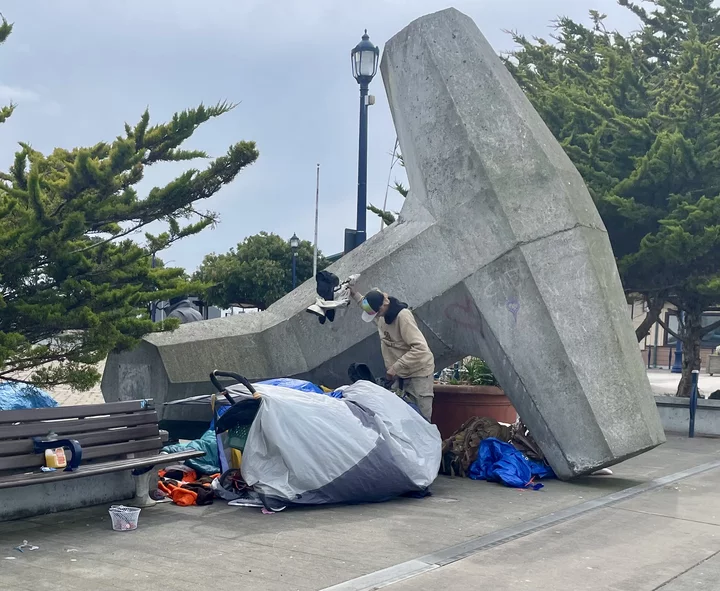A homeless man uses the dolos on the Eureka boardwalk as a windbreak. | Photo by Ryan Burns.
###
PREVIOUSLY:
- Homelessness Is on the California Ballot This March. Will Conditions Change on the Street?
- TODAY in SUPES: County Eyes Major Changes to Mental Health Programs, Awards $1M in Measure Z Revenues to Road Repairs
- Newsom Hits the Road for Mental Health Measure as Poll Shows Declining Enthusiasm for Prop. 1
- Californians Are Voting on Prop. 1, Gavin Newsom’s Mental Health Plan. Here’s What It Does
- Why Prop. 1 Foes Are Getting Back in the Fight
- With Prop. 1, Gavin Newsom Again Changes How Californians With Mental Illness Get Help
###
Last month, California voters just barely passed Proposition 1, Gov. Gavin Newsom’s $6.4 billion plan to overhaul the state’s community mental health and substance abuse program.
The two-pronged measure will use revenue from a nearly $6.38 billion bond to build treatment facilities and supportive housing. It will also change the way counties spend revenues from a 1 percent “millionaires tax” known as the Mental Health Services Act (MHSA), approved by voters in 2004.
Supporters of Prop. 1, including U.S. VETS, the National Alliance on Mental Illness of California and the mayors of many cities including San Francisco and Los Angeles, say this much-needed reset will direct more resources to the people who need it most — namely, chronically homeless folks with mental health diagnoses or addiction disorders.
But a coalition of opponents, who derided the election results “an embarrassing squeaker of a victory,” say Prop. 1 will “steal” money from existing mental health services managed by individual counties.
Counties currently receive about 95 percent of the money available from the MHSA, but once Prop. 1 is implemented that amount will drop to 90 percent, meaning an estimated $140 million per year will go to the state instead.
Opponents also say that redirecting MHSA money to build housing will result in up to $1 billion in cuts to existing mental health programs, such as crisis response and wraparound services like education and employment assistance.
Voters here in Humboldt County followed the statewide trend, narrowly approving Prop. 1. In an interview with the Outpost, Oliver Gonzalez, the county’s MHSA program manager, said it’s too soon to tell how Prop. 1 will impact local services because much of its language is generalized and the details have yet to be worked out.
“There are a lot of concerns, of course, from stakeholders, from people in our community [and] all across California about what it could mean for existing programs,” Gonzalez said. Humboldt County, like all others in the state, will see a reduction in funding across the board for MHSA programs, and yet staff must now figure out how to implement new requirements to address substance use disorders and housing.
“We don’t even know how we’re going to implement 99 percent of the things Prop. 1 is proposing,” Gonzalez said. “We don’t have the language for it yet.”
Historically, local MHSA programs have been designed through a collaborative process, with input from a broad range of stakeholders such as the Hope Center, the Humboldt County Transition-Age Youth Collaboration (HCTAYC), family resource centers, the Behavioral Health Board and the local chapter of the National Alliance on Mental Health.
“MHSA has always been this very flexible source of income that can be molded to our county’s unique needs,” Gonzalez said. “With these new changes, we’ll have to navigate more regulations and more requirements with less funding. And essentially it would make us not be able to leverage as much stakeholder input.”
When Gonzalez last made the rounds with stakeholders, telling them about Prop. 1, many people didn’t even know what it was or what its implications will be, he said, and some asked why Californians were being asked to vote on something so nebulous.
“But also there was a kind of underlying concern … like, what does that really mean for existing programs? And, again, it’s an open question that doesn’t have an answer yet,” Gonzalez said.
In the two decades since voters passed the MHSA, a cornerstone of its implementation has been that the services are voluntary. Prop. 1, by contrast, will allow bond revenues to be spent on involuntary treatment facilities. Meanwhile, last October, Newsom signed Senate Bill 43, which broadens the definition of “gravely disabled,” making a lot more people eligible for involuntary conservatorship.
Back in January, Humboldt County Behavioral Health Director Emi Botzler-Rodgers told the Board of Supervisors that the bill could increase eligibility for such programs from about one percent of the population to about 10 percent. The county has asked for implementation to be delayed until Jan. 1, 2026.
“With these new additions and changes as they’re doing, they’re kind of blurring the lines a little bit as to what will be voluntary and what will be involuntary,” Gonzalez said. “So a lot of advocates have been really voicing that concern.”
That concern extends across the state. In a recent meeting with the MHSA directors of all 58 counties in California, virtually all of them remarked on the questions and concerns being voiced by members of their communities and the fact that they, the MHSA directors, don’t have many answers, Gonzalez said.
Under Prop. 1, the Mental Health Services Act will be renamed the Behavioral Health Services Act. Aside from a few administrative changes that have already been made, most provisions of the measure won’t go into effect until July 1, 2026.
In the coming months, Gonzalez expects the state to issue “cleanup language” clarifying some provisions of the measure. After that, he said, he can start working with local stakeholders to revise their approach to comply with the new realities.
“That way we can at least start preparing to see exactly how we can navigate these changes, how we can preserve programs and protect them as much as we can, because that’s really the ultimate concern.”

CLICK TO MANAGE